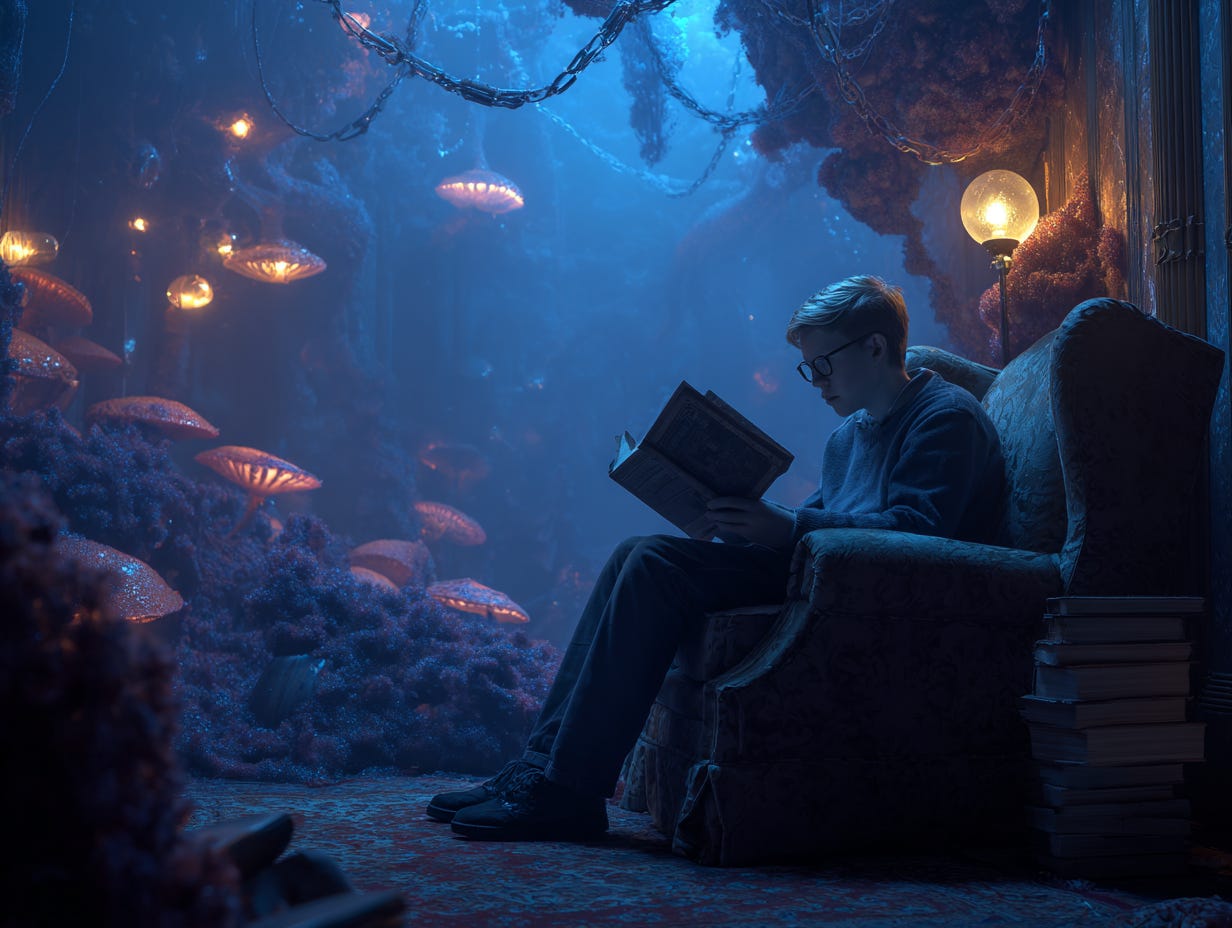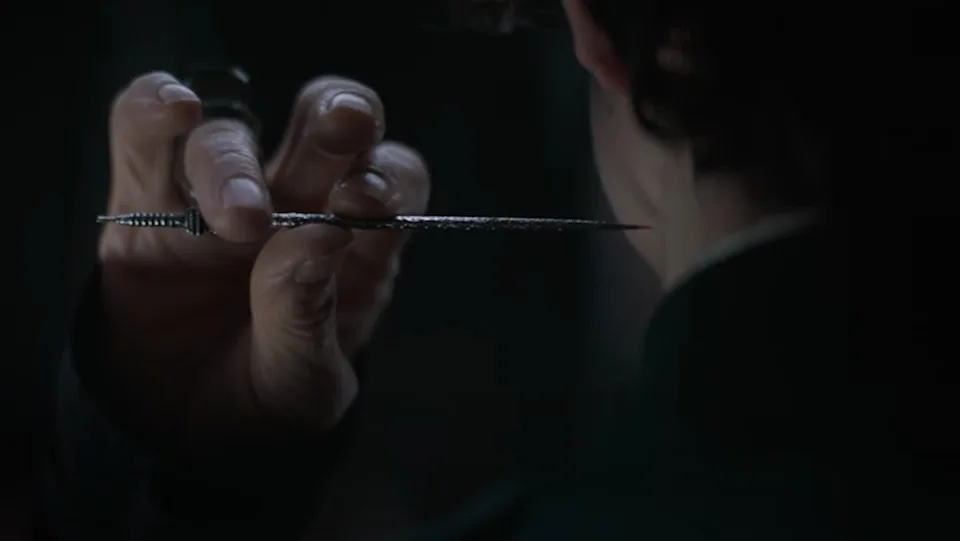At my son's Back to School Night, I sat in his English class while his teacher listed the books they'd be reading: Romeo and Juliet, The Other Wes Moore, and Homer's Odyssey. That's when a thought hit me: most of life's answers aren't found in textbooks, essays, or debates. They're hidden in stories. Especially fiction.
When we want to better ourselves, we tend to reach for the obvious sources: self-help books and podcasts. They promise direct answers and step-by-step instructions, usually from professionals or from those already living the life we want. But how often do these lessons actually stick?
Fiction is different. It doesn't lecture. It embodies and sneaks in its wisdom through characters we relate to, characters we root for, characters whose struggles mirror our own. Because we're emotionally invested in them, their lessons hit us like revelations.
Stories bypass our rational defenses and let us experience truth emotionally, and it's exactly that emotional state that drives its impact, resonates, and makes it life-changing.
I learned this first-hand in junior high when I picked up Frank Herbert's Dune. I was fifteen, the same age as the main character, Paul Atreides. In the novel, Paul is tested by the Reverend Mother to determine if he possesses the self-control and willpower to be considered "truly human". A test critical to the evaluation of his potential to become a super-being who can access both masculine and feminine pasts. He's told to place his hand in a box while a poisoned needle rests at his neck. If he pulls his hand out of the box, he dies.
"What's in the box?" Paul asks.
"Pain," she replies.
As the pain builds to intolerable levels, Paul repeats the Bene Gesserit Litany of Fear:
"I must not fear. Fear is the mind-killer. Fear is the little death that brings total obliteration. I will face my fear. I will permit it to pass over me and through me. And when it has gone past, I will turn the inner eye to see its path. Where the fear has gone, there will be nothing. Only I will remain."
Paul was fifteen. I was fifteen. Watching him work through his fear to achieve greatness marked me. I'd grown up with a paralyzing fear of heights after witnessing a terrible incident very young. That fear stayed with me. But after that book, whenever I found myself high on a cliffside when backpacking with my best friend, I remembered Paul and the litany. I pushed past it, which led to some of my greatest trips and memories.
In contrast, I've read my share of self-help books, but none ever left me with a line I could quote years later. None ever changed how I behaved or perceived the world in the moment.
Fiction did.
That's the paradox. Fiction isn't "real", but it's born from real human experience: knowledge, wisdom, suffering, and hope. That's why it sticks. In marketing, the most successful brands don't sell products; they sell stories. Stories are how we make sense of the world and ourselves, especially when we're young.
“If you tell the truth, you do not need a good memory.” —Mark Twain, The Adventures of Huckleberry Finn
The tragedy is that we're reading fewer books.
In 2023, only 14% of 13-year-olds reported reading for fun "almost every day," down from 27% in 2012*. Among adults, it's worse. Those who read daily for pleasure fell from 28% in 2004 to just 16% in 2023*.
There is hope, though. Booktok, Bookstagram, audiobooks, and even fan fiction communities are helping to revive reading. Especially for Gen Z. Those platforms are even resurrecting decades-old titles and launching them back onto bestseller lists.
“Maybe there ain’t no sin and there ain’t no virtue, they’s just what people does. Some things folks do are nice and some ain’t so nice, and that’s all any man’s got a right to say.”—John Steinbeck, Grapes of Wrath
The above was another aha moment for me, delivered by the preacher John Casey in John Steinbeck's The Grapes of Wrath. That's the thing about fiction: it smuggles truth in its story. One line from a novel can rewire how you see morality more effectively than a dozen debates or philosophy textbooks. Steinbeck didn't need to explain ethics in an essay. He gave us flawed, breathing people, and in doing so, showed us a truth about ourselves.
When we're young, we look for heroes, and in the best books, the heroes are always flawed. Just like us. But they are also brave, moral, and just. All character traits that we can aspire to. They remind us that to be human is to stumble, and to be good is to keep moving forward, regardless of how many times you fall.
"It's only after we've lost everything that we're freed to do anything."—Chuck Palahniuk, Fight Club
So if you're searching for answers, maybe skip the next "10 Steps to a Better You" podcast episode. Pick up a classic novel instead, any novel. The answers are probably already there, waiting.
A few books that gave me "aha" moments:
Miyamoto Musashi—Eiji Yoshikawa
Catcher in the Rye— J.D. Salinger
Fight Club—Chuck Palahniuk
Dune—Frank Herbert
The Lord of the Rings—J.R.R. Tolkien
The Grapes of Wrath, The Pearl, Of Mice and Men— John Steinbeck
Charlotte's Web—E.B. White
Grendel—John Gardner
The Razor's Edge—Somerset W. Maugham
Animal Farm—George Orwell
The Metamorphosis—Franz Kafka
The Hunchback of Notre Dame—Victor Hugo
I am Legend—Richard Matheson
The Old Man and The Sea—Ernest Hemingway
*Source: National Assessment of Educational Progress (NAEP) / National Endowment for the Arts (NEA)
*Source: American Time Use Survey (ATUS), Bureau of Labor Statistics — analyzed by San Antonio Express-News editorial (2023).
I hate paywalls. They kill curiosity and reward clickbait. That’s why the core content here will always be free.
But this takes time, thought, and energy. If it helps you see the world differently, consider supporting it by buying me a coffee or becoming a paid subscriber for exclusive content, audio versions of each essay (coming soon), and deeper dives.
Thanks for being here. Stay Curious. Question Everything.
–Luis





Once again, great stuff. I couldn’t agree more, and your recommendations are excellent. I still have a long way to go before I become as good a novel reader as you, Luis!
One of my favorites that I think about more and more as I get older is , "So we beat on, boats against the current, borne back ceaselessly into the past." - THE GREAT GATSBY